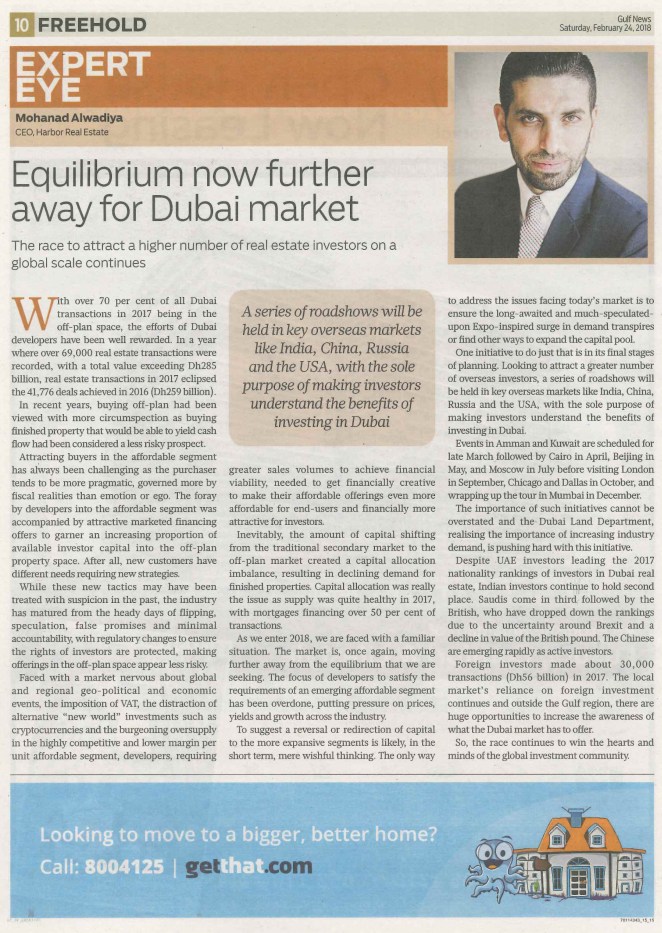There has been a very pleasing trend that has developed during 2016 which is yet another demonstration of the development and maturation of Dubai’s Real Estate industry.
The marked increase in the utilization of mortgages to purchase properties in the emirate demonstrates a market that has undergone a structural shift to supply more affordable properties and the maturation of buyers in structuring their financial affairs to obtain a mortgage and buy the home of their dreams. For the first t.
Historically, mortgages have represented no more than 30%-35% of property sales in the emirate. This ration has now climbed to over 50% during 2016 and, in some months, levels of 60+% were achieved.
This is great news for several reasons.
First, while this trend highlights confidence of lenders in the marketplace it also highlights the increasing confidence of consumers, mostly owner occupiers, in the market to the extent that they are prepared to take on the risks associated with committing to a mortgage for the sake of purchasing some property.
This is very important to the development of long term sustainable growth for the industry as the bedrock of any property industry is its owner occupiers. They represent the core of the industry as it is they who view property as an investment in life, not just a way to make a quick buck. And yet, historically, they have attracted focus in a market still undergoing the maturation process which is falling short and not proportionate to their importance.
Owner occupiers see Real Estate in a different light. For them, it’s about creating a lifestyle. It’s about creating a home which will provide an environment that is safe and secure within which the individual, couple or family can grow and develop in all aspects whether physical, emotional, social and, of course, financial. In this respect, they have a lot more at stake than those investors with financial interests only.
Typically, they form the core of society, not overly wealthy, who are concerned with providing the family with a future. For some, the purchase of the first family home is the first step towards creating a legacy which hopefully, for the more romantically minded, will turn into a dynasty. These are the dreams which make owning their own home the most important decision they are likely to make. They are in it for the long term; there is a lot at stake, which is why availability of finance through mortgages is critical.
The second reason why this is such good news is because we are witnessing, in real time, the market adapting to legislative changes that were made in early 2014. There is no doubt that the implementation of the mortgage caps earlier in 2014 had affected the demand for many first home buyers who were relying on a mortgage to acquire their dream home. I remember writing an article at the time of the legislative change and observing the following …
“At Harbor, we see 62% of our clients who were considering buying a property prior to the mortgage caps delay their purchase until they can accumulate the down-payment differential while 38% have settled (or compromised) for a cheaper property to get an initial foothold in the market.”
As predicted, “… the new mortgage caps have certainly produced a definite lag in demand as clients adjust to the new financial realities and many of these clients are planning to participate within the next three years.”
I am pleased to say, that these observations have essentially been proven correct. The legislative change made by authorities was implemented to help cool what was then, a rampant market. The desired effect was achieved but buyers didn’t simply disappear, they modified their purchasing behavior, another sign of an increasingly resilient and maturing market.
Finally, a growing number of mortgages are being undertaken for properties that are purchased in the more affordable areas of Dubai, which further demonstrates the systemic shift to affordable housing in the Dubai property market is becoming even further entrenched as a long-term characteristic.
A natural occurrence within any economy that is growing rapidly and is formally recognized as maturing and transitioning from being a “frontier” to “emerging” market as Dubai did back in 2013, is that its middle and lower-middle income segments will expand to support the rapid rise in commercial activities and economic initiatives being instigated by entrepreneurs and corporate or government entities. This expansion is unavoidable if the economy is to grow and providing affordable housing to enable this expansion is a critical element to the future growth of Dubai and the development of the Real Estate industry into a mature model that can efficiently cater for a broad and diverse set of people with different incomes, tastes, preferences and requirements.
And demand is set to grow very rapidly. A case in point … the World Expo is predicted by independent analysts to create over 270,000 jobs. The vast majority of these jobs will not be for people occupying senior executive positions. They will be for people in middle management or lower positions, many with families, who will be seeking affordable accommodation.
The importance of maintaining affordability for the average buyer is critical and the availability of affordable finance in the form of mortgages is vital to enable many to gain access this lucrative market going forward.








